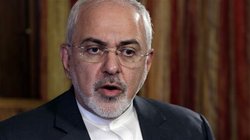 Iranian Foreign Minister Mohammad Javad Zarif said that Washington's hostile policy of imposing sanctions is a pathological addiction that is affecting both friends and foes of the US, urging a collective measure against the White House’s destructive approach.
Iranian Foreign Minister Mohammad Javad Zarif said that Washington's hostile policy of imposing sanctions is a pathological addiction that is affecting both friends and foes of the US, urging a collective measure against the White House’s destructive approach. RNA - “The US' approach to sanctions betrays a pathological and reckless addiction—a condition that renders no bounds or boundary to what the US may or may not do,” Zarif said in a tweet on Sunday.
The Iranian foreign minister added that “this addictive behavior affects friends and foes alike, unless collectively pushed back”.
Zarif made the remarks two days after Iran's ambassador to the United Nations censured the United States’ sanctions against the country, saying the measures were negatively affecting the daily lives of millions of ordinary Iranians.
Majid Takht-Ravanchi, speaking at a United Nations General Assembly meeting in New York on Friday, said the sanctions "are neither short of war nor better than or an alternative to war," and that they are actually tantamount to war “but by other means and names”.
He further noted that Washington has extended its sanctions against Iranians through weaponizing food and medicine, and in total disregard of an International Court of Justice (ICJ) ruling, which ordered the US on October 3, 2018, "to lift sanctions linked to humanitarian goods and civil aviation imposed against Iran."
Tensions have been running high between Iran and the United States since May 2018, when President Donald Trump unilaterally withdrew the US from a multilateral nuclear deal with Iran, officially known as the Joint Comprehensive Plan of Action (JCPOA), and unleashed the “toughest ever” sanctions against the Islamic Republic.
Since quitting the landmark 2015 nuclear deal with Iran, Trump has been running a "maximum pressure" campaign to force Iran into negotiating a new deal that addresses its ballistic missile program and regional influence.
Iran, which had been fully complying with all of its commitments despite the US withdrawal and the Europeans’ failure to abide by their obligations under the deal, began scaling down its commitments in early July.
On Sunday, Iranian Deputy Foreign Minister Seyed Abbas Araqchi told Japanese media “NHK” that unilateral sanctions of the US against his country is the main source of problems in bilateral relations between Tehran and Tokyo, adding that the two sides are resolute to boost relations.
Iranian President Hassan Rouhani used the opening ceremony of Kuala Lumpur Summit 2019 on Thursday to strongly criticize the US sanctions against Tehran, describing them as economic terrorism.
According to Fars News Agency, Rouhani outlined the numerous challenges facing the Muslim world in the spheres of economy, security culture and identity, warning that such issues are hampering the progress of Islamic nations both at home and on the international stage.
On Wednesday Iran's Representative at the Third Committee of the United Nations General Assembly Mohammad Hassaninejad said that the US sanctions and economic terrorism against Iran have directly targeted the vulnerable people in the country, including special-case patients.
"Today, my people are struggling to protect their basic human rights against a genocidal economic war waged by the United States. The economic terrorism that the United States has unleashed against Iranians, particularly the most vulnerable among them, deliberately and indiscriminately violates their basic human rights, including their right to food, their right to education, their right to health and their right to life," Hassaninejad said, addressing a UN General Assembly meeting in New York.
847/940